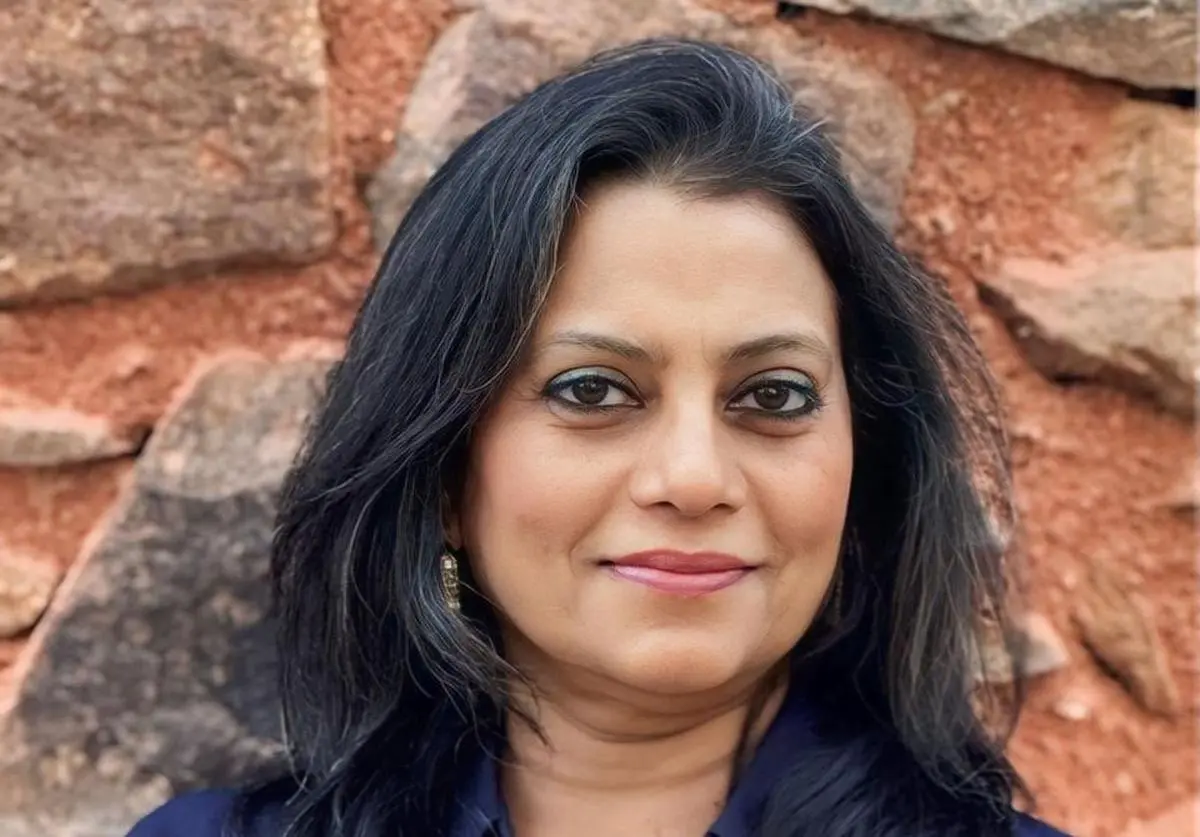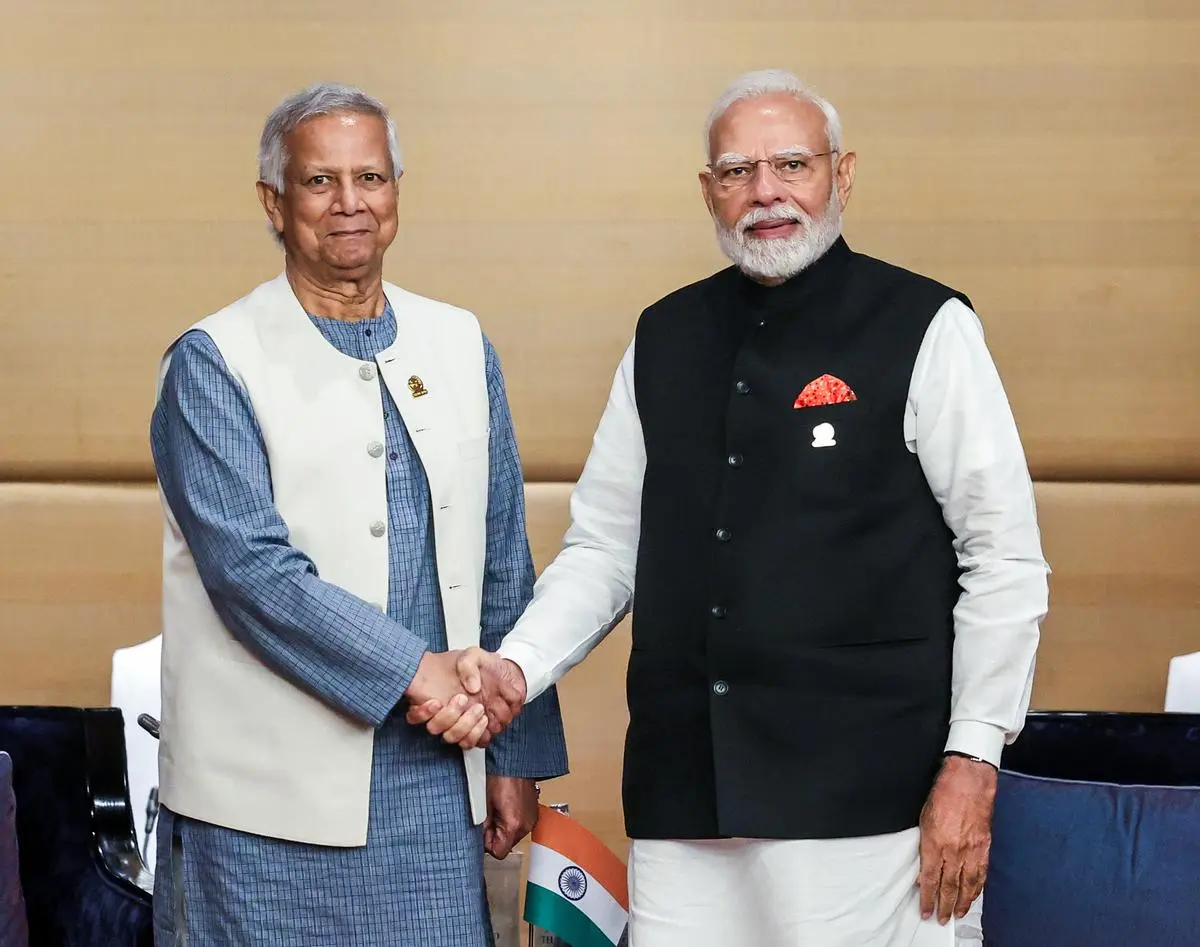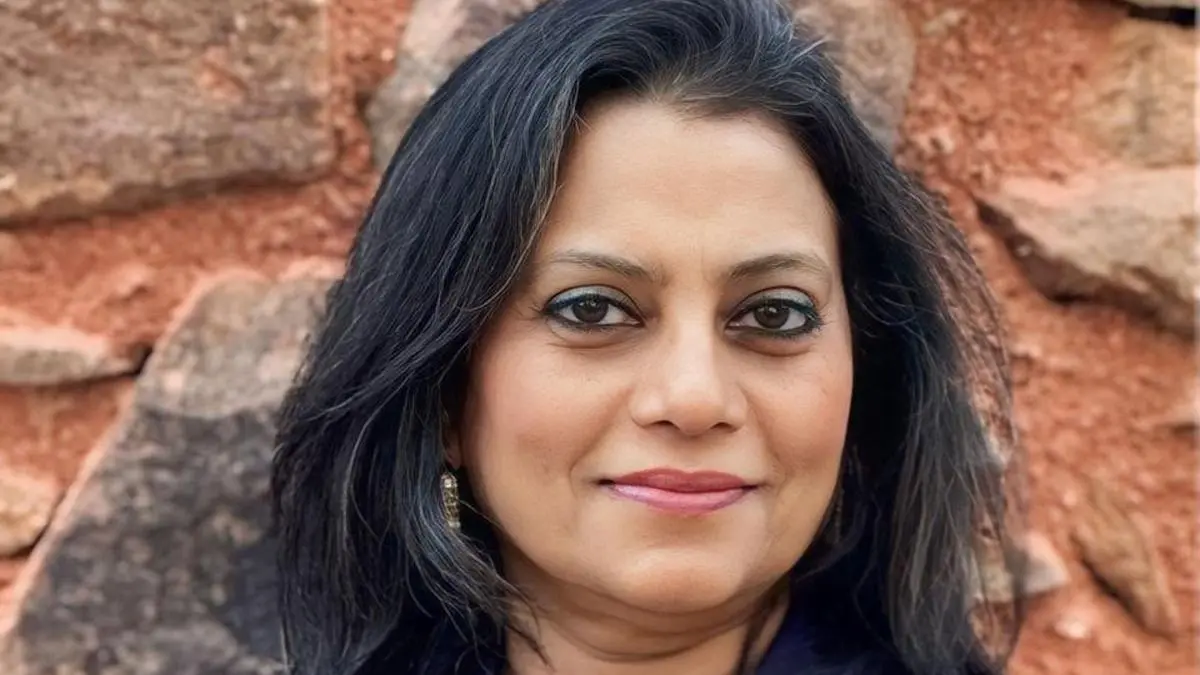In this episode of Latitude, host Nirupama Subramanian spoke to Sreeradha Datta, a professor of international relations at O.P. Jindal Global University who specialises in South Asia. Datta discusses developments in Bangladesh where Muhammad Yunus, the Chief Advisor, conveyed through a representative a few days ago that he was going to step down because of non-cooperation by various stakeholders.


Sreeradha Datta is a professor of international relations at O.P. Jindal Global University. Her area of specialisation is South Asia, with special focus on Bangladesh. She studies cross-border issues, security, and bilateral ties in the region.
| Photo Credit:
By Special Arrangement
While the 84-year-old Yunus has since stepped back from the decision, the uncertainty continues amid reports that differences have developed between him and the Bangladesh army. Datta also discusses India-Bangladesh relations and what can be done to restore the bilateral ties that existed before Prime Minister Sheikh Hasina’s ouster in August 2024. Edited excerpts:
What do you make of this sudden announcement by Muhammad Yunus that he wished to quit, and then, equally quickly, his withdrawal of that decision? Was this just a trial balloon, a pressure tactic, or did he really mean it seriously?
I would think it’s actually a mix of all those three basic factors. Yes, there were a lot of different variant voices, at times divisive voices, also and different stakeholders who had a different point of view. Also, there was a problem of the road map for the elections. We’ve seen the BNP [Bangladesh Nationalist Party] and others [who] want early elections in December. The student leaders, the Jamaat-e-Islami, they want elections to be deferred because clearly their ground is not ready for it as yet. And the question of the reforms, which Dr. Yunus himself said in his early days, that anything from one year to three years, so it was kept widely open then. He’s frustrated, he’s exasperated, he’s not happy trying to do this. But I think that all party meeting which took place two days ago was basically putting faith on him because at this point of juncture, if he steps down, this would be political mayhem again. All the stakeholders agreed that the best way forward is Professor Yunus. And I think that’s what he mentioned yesterday, that he’s not going to stay beyond June 30 next year.
The BNP and the military have been demanding elections by December this year. Would they be happy about this extended timeline to June 30, 2026?
The BNP is certainly because they know this is a good time for them. There’s a huge wave in their favour at this point in time, which they don’t want to miss out on. But again, he has mentioned reforms. The basic reform everybody agrees on is the electoral reform. The election commission has already got the voters’ list out, where people can address the anomalies. But for these reforms to take shape, you would need all-party consensus. Many of the reform reports have been accepted by the interim government. But now they have to have a process where everybody is on board with it. And there is an opinion that an elected government is best suited for this purpose.
Should Yunus not be really concentrating on holding the election? These reforms are best addressed by an elected government. Where is this coming from?
If you recall, Bangladesh between 2006 and 2008 had a similar interim period when it was a caretaker government. At that point in time, there has been opinion among many Bangladeshis that many reforms that the nation needed weren’t undertaken, the systemic problems that Bangladesh has. Similarly, now I have spoken to some of the advisors who talked about the very deep-rooted systemic problems that need to be addressed. But I don’t think it’s possible to address them overnight. The opinion of Yunus and some who back him suggests that, suppose it went to election straight away, the country was going to go back to the same chaos, the same mayhem of not being able to address the systemic problems. My argument is that even if you do bring in very strong reforms, what is to say a political party that has an overwhelming majority in the parliament is not going to come and overrule all of that. It’s a political culture that needs to be addressed, and it can’t be done just through paper.
Also Read | BNP and Jamaat’s London huddle stirs political pot in Bangladesh
When Yunus said he wanted to quit because he was not being allowed to govern, what was actually happening on the ground in Bangladesh?
What we saw immediately in the aftermath of the August 5 uprising, we’ve seen different stakeholders suddenly jump in. Students were the front face of that movement. Now, often we’ve seen when students campaign for change, the whole country awakens to the fact that if we all go to the streets in masses, we want to get our wishlist done. So we’ve seen all kinds of people on the road in that particular mood that we can do this through street power. I think Yunus gave them too much space, essentially because he felt the previous regime wasn’t engaging, especially the youth. But at the same time, when we suddenly see a lot of these Islamist elements suddenly out and voicing – maybe at a political level, they probably have absolutely no space, but this social space was sadly too much. Those elements, their street power is immense. These Islamist elements, hopefully have absolutely zero electoral presence. But this street power, their social power is a lot.
He seemed to suggest there were differences between the army and the interim administration. What really is that relationship?
I would think they don’t have to be on the same page on every issue. The main controversy which we saw in the public domain is on the humanitarian corridor.
Can you please explain this humanitarian corridor?
This is basically a space they wanted to create on the common border where Bangladesh would provide material, food, and essential items for the people of the Rakhine region who didn’t even have gas to cook their food on in the aftermath of the earthquake and the huge, violent situation that continues to exist there. The army chief reacted to that because clearly this is a strategic decision. The army needed to be consulted. And I don’t think the consultation process actually happened. So I think then the media advisor said, no, we’ve not decided on anything as yet. This is a matter of discussion going on at this point of time.
“In Bangladesh, despite the social media angst about India, every political stakeholder and any urban Bangladeshi will tell you that India is a neighbour that they will have to work with.”
Has this crisis blown over? Are things now going to be easy for Yunus?
It’s very difficult to say that about Bangladesh. They’re extremely given to emotions and histrionics. But largely, I would say, especially the political stakeholders, I think they do understand that it’s important to have stability here because otherwise nobody wins. For their own sake, they will ensure. But again, there’s always this particular element in Bangladesh about Islamists being given a very open hand suddenly. We’ve seen many decisions, people being released from prison. We don’t know which way the narrative was going to be taken by those kind of elements.
What are they doing to reign in these Islamists?
No, I don’t think one sees that really. These elements are part of not necessarily just Hefazat[-e-Islam Bangladesh], but many small groups who were also been accused of terror attacks in the past. They are the ones who are out on the street now. Suddenly, Bangladeshi friends that I speak to said we’ve never seen these kinds of elements. They said, we ourselves, we don’t know who they are and where they have suddenly emerged from. There’s a kind of very black hole here about their presence.
If they do not have popular support, why is the interim administration reluctant to crack down against them?
We’ve been wondering ourselves when we discuss Bangladesh as to why we don’t see the interim come down much more sharply on them. We’ve seen huge violence against minorities. The interim government, the student leaders have constantly denounced it and said that we’ll try and do whatever we can, but we’ve still seen huge outbreaks happening constantly. I think they probably thought the more they go against them, there’ll be more such elements rising to the surface. So it was best to not give them too much of importance.


Prime Minister Narendra Modi meets Bangladesh Chief Adviser Muhammad Yunus on the sidelines of the BIMSTEC Summit, in Bangkok on April 4, 2025. According to Prof. Datta, every political entity in Bangladesh has stressed that India remains Bangladesh’s most important neighbour.
| Photo Credit:
ANI
The army has spoken about holding an inclusive election—an indirect demand that the Awami League should be allowed to take part. But the Awami League has been banned. How does this get resolved?
This was going to be a tricky point, always. The BNP has said that our military should be there as a multi-party because their argument is that this is exactly what was happening during our military’s time—that the BNP was not allowed to vote. But I wish the judiciary, the legal proceedings would have been far more hastened. What they’ve done is a ban on Awami League activities till the criminal procedures are not [completed]. So why could they not initiate? The entire nation was behind that, they would support the legal process to be initiated. It’s a historical party, the largest political party of Bangladesh. So you can’t keep them out for long. But this is a difficult position because who comes as the opposition leader, as the opposition political party? That middle ground is completely been vacuum at this point of time.
If the Awami League were allowed to participate in the coming election, how would it perform?
There is a very basic 25-28 per cent strength of voters who have always backed the Awami League. They continue to be there. Even if they may lose some supporters, there would still certainly be a ground support for the Awami League. It doesn’t have to be in the name of a particular leader but as a political party. On the whole, voters vote on a different psychology that even if the Awami League did what they did, it is still better than a religious or a more conservative political party. There will be a vast wave of support for the BNP because they’ve been saying some very responsible things at this point of time.
How active is Sheikh Hasina herself in party matters? She is in India in exile.
In the initial days and months, we saw Sheikh Hasina relay a lot of messages and phone conversations being released by party members, because she was constantly in touch with them. But in the last couple of weeks, months, I’ve not heard much. I don’t think she thinks she needs to rebuild. She thinks the party exists because every time she’s publicly spoken, she’s always said that I’m coming back. So she thinks the party is fine. I don’t think she’s doing any kind of a reality check.
Also Read | India comments on treatment of Hindus in Bangladesh but must know its treatment of Muslims has repercussions: Debapriya Bhattacharya
Is there a chance that she has a political future in Bangladesh if she goes back?
Actually, I doubt that. I would think the best way to keep the Awami League there strongly is if she steps back and lets other leaders take forward. But the misdeeds of Sheikh Hasina are far too much, far too high. I don’t think that after what she did, especially with the students, unarmed students, and the kind of bloodbath that we saw, I don’t think she would be excused by anyone there, even people who have supported Awami League.
I want to come to relations with India. Is there any attempt by Delhi to re-establish ties with the Yunus government, apart from the meeting between Prime Minister Modi and Professor Yunus during the BIMSTEC (Bay of Bengal Initiative for Multi-Sectoral Technical and Economic Cooperation) meeting?
I wouldn’t think so. India’s very deliberately keeping quiet. Some basic communication is open, but it wouldn’t want to do anything beyond that. Yunus hasn’t helped the case either. A lot of the pronunciations about the north-east, about Lalmonirhat, about China, about Pakistan hasn’t gone down well. Apart from the communal violence issues and the fact that we hated anybody who would oust Sheikh Hasina. We don’t support the interim [government] at all. We think it’s not a legitimate government. And then we don’t like Yunus also because of what Sheikh Hasina’s opinion about him is.
How have India’s restrictions on Bangladeshi exports gone down in Bangladesh?
That message has been very clearly conveyed: what is emanating from Bangladesh is not something that India is very happy to hear. But I recall a BBC interview where Yunus talks about how now he says India is the most important neighbour. I’ve heard from every political entity in Bangladesh—not one of them has ever said that India is not important to us. But the noises that have come out from Bangladesh haven’t endeared them to us. There is no doubt in Bangladesh, despite the social media angst about India, every political stakeholder and any urban Bangladeshi will tell you that India is a neighbour that they will have to work with.
Can India really hope to pick up this relationship with an elected government after so much bad blood?
Let’s face it, in a situation like this, the problems are faced both by Indians and Bangladeshis, but Indians have the capacity, a larger capacity, to absorb the issue and move on with it. Bangladesh has the perception that the Awami League was able to sustain itself because India supported it. So there are youth groups who are very angsty about India on these issues. But I’ve always argued that India and Bangladesh are destined to work together. That’s how it should be because the cost of non cooperation is so very high for both. Just that India has a capacity to absorb it and move along; it will hurt Bangladesh much more. So it will be in Bangladesh’s interest also once an elected government comes in place to reach out. But the basic thing is that security parameters are going to be safe with every political entity. For India that’s the basic red line that if that is not addressed, nothing matters.
Nirupama Subramanian is an independent journalist who has worked earlier at The Hindu and at The Indian Express.

